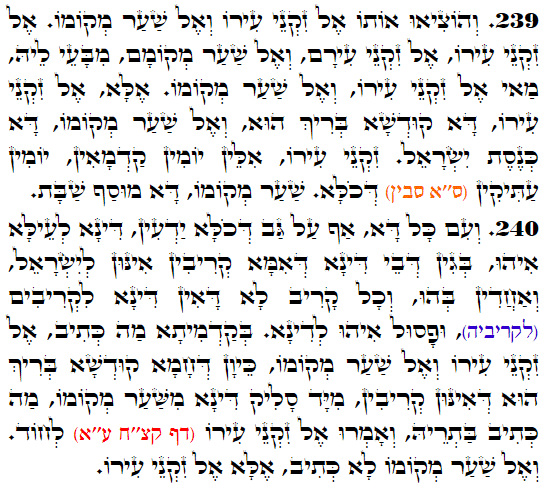Daily Zohar # 3396 – Balak – He is bad but the Ancient is on his side
.
Hebrew translation:
240. וְעִם כָּל זֶה, אַף עַל גַּב שֶׁכֻּלָּם יוֹדְעִים, דִּין לְמַעְלָה הוּא, מִשּׁוּם שֶׁבֵּית דִּין שֶׁל אִמָּא קְרוֹבִים הֵם לְיִשְׂרָאֵל וְאוֹחֲזִים בָּהֶם, וְכָל קָרוֹב לֹא דָן דִּין לִקְרוֹבִים (לִקְרוֹבָיו), וּפָסוּל הוּא לְדִין. בַּתְּחִלָּה מַה כָּתוּב? אֶל זִקְנֵי עִירוֹ וְאֶל שַׁעַר מְקֹמוֹ. כֵּיוָן שֶׁרָאָה הַקָּדוֹשׁ בָּרוּךְ הוּא שֶׁהֵם קְרוֹבִים, מִיָּד סִלֵּק הַדִּין מִשַּׁעַר מְקוֹמוֹ. מַה כָּתוּב אַחֲרָיו? וְאָמְרוּ אֶל זִקְנֵי עִירוֹ, לְחוּד. וְאֶל שַׁעַר מְקוֹמוֹ לֹא כָתוּב, אֶלָּא אֶל זִקְנֵי עִירוֹ.
.
Zohar Balak
Deuteronomy 21:19 “וְתָפְשׂוּ בוֹ אָבִיו וְאִמּוֹ וְהוֹצִיאוּ אֹתוֹ אֶל זִקְנֵי עִירוֹ וְאֶל שַׁעַר מְקֹמוֹ.” “Then shall his father and his mother lay hold on him, and bring him out unto the elders of his city, and unto the gate of his place;”
#239
The verse says ‘unto the elders of his city’ then ‘unto the gate of his place’. The latter is in singular form when it should properly say ‘the gate of their place.’ The Zohar explains that the ‘elders’ refers to the Holy One Blessed be He, and ‘the gate of his place’ is the congregation of Israel.
Also, the ‘elders’ refer to ancient days that is the aspect of the upper three Sefirot of Zeir Anpin. The ‘gate of his place’ is the Musaf prayer of Shabbat that adds a connection to the upper three sefirot of Malchut.
#240
We know that judgment comes from above and the court of the mother that is Malchut is attached to the children of Israel. A relative cannot sit in court and judge his relatives. Therefore he is disqualified from passing sentences on them. When the father and mother came with their complaint about their son, the Holy One Blessed be He saw that they are relative. He removed the judgment from ‘the gate of his place’. For that reason, the verse that follows says ‘unto the elders’ and skips ‘the gate of his place’ that refers to Malchut.
(Deuteronomy 21:20) “וְאָמְרוּ אֶל זִקְנֵי עִירוֹ בְּנֵנוּ זֶה סוֹרֵר וּמֹרֶה אֵינֶנּוּ שֹׁמֵעַ בְּקֹלֵנוּ זוֹלֵל וְסֹבֵא.”
“And they shall say to the elders of his city, ‘This son of ours is stubborn and rebellious; he will not obey our voice; he is a glutton and a drunkard.’”
We see that the ‘tone’ has changed and it tells us that there is another aspect to look into the son’s behavior.
Continues in the next study
Lesson;
The Sefirot are also called days as we read in the story of creation. The seven days of Creation have the aspect of the seven sefirot of Chessed to Malchut. ‘Ancient days’ that we read above have the aspect of the upper three Sefirot, Keter, Chokmah, and Binah. From the ‘ancient’ comes the attributes of mercy and pure light that manifest into pleasures and everything that is good in this world. In the book of Daniel, we read a description of the ‘Ancient of Days’ that the prophet saw in his vision. The ‘Ancient’ is pure light and the vision of the prophet saw is just a ‘translated’ form that appeared in his mind.
Daniel 7:9 “חָזֵה הֲוֵית עַד דִּי כָרְסָוָן רְמִיו וְעַתִּיק יוֹמִין יְתִב לְבוּשֵׁהּ כִּתְלַג חִוָּר וּשְׂעַר רֵאשֵׁהּ כַּעֲמַר נְקֵא כָּרְסְיֵהּ שְׁבִיבִין דִּי נוּר גַּלְגִּלּוֹהִי נוּר דָּלִק.”
“I watched till thrones were put in place, And the Ancient of Days was seated; His garment was white as snow, And the hair of His head was like pure wool. His throne was a fiery flame, Its wheels a burning fire;”
{||}

 Previous: Balak
Previous: Balak


